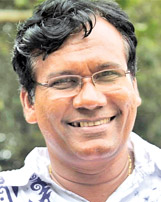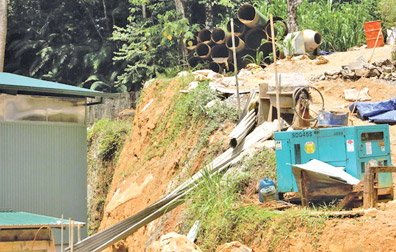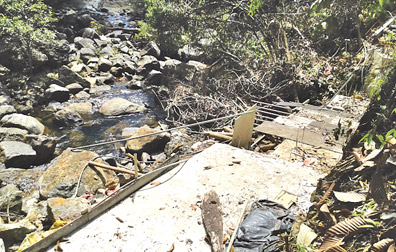|
Dellawa, Erathna villagers protest mini-hydrel
project:
Mauling our forest cover
by Dhaneshi Yatawara
Hot on the heels of power shortages and blackouts, villagers in
Dellawa in the Galle District and Erathna in the Ratnapura district are
up in arms against the setting up of mini hydropower projects, to
protect their niche - the pristine environment they live in, which
protected them from devastating dry, hot weather and rains which came at
the wrong time as a result of climate change. These two villages are
facing destruction due to the proposed setting up of mini hydro power
plants in their villages.
 |
 |
| Kusum
Athukorala |
Hemantha
Withanage |
The local village communities in the Galle and Ratnapura Districts
have grouped together to give a good fight to rich businessmen and
corrupt politicians who are out to exploit their environment to set up
these mini hydro power plants, at a time when the village is already
facing the unavoidable consequences of climate change.
Today, it is widely accepted that all significant sources of hydro
potential have been exhausted in the island and the possibility of
further expansion is rather limited. Despite this fact, the emphasis on
setting up mini hydro power plants is heavily questioned by these native
people of the Dellawa and Erathna villages.
While 160 world leaders signed the Paris Agreement on April 22,
pledging to take every possible step to stop global warming, rising
above 1.5 Centigrade, natives of these villages, are still fighting to
save the ecosystem which protects the village from climate change
calamities.
 |
|
The ecological impact of
the project is potentially high.
- ranforest protectors.jpg |
 |
|
The weir built crossing the
Anda dola (rivulet), a tributary of the Gin ganga, one of the
major rivers in southern Sri Lanka
- rainforest protectors.jpg |
With the increasing demand for electricity in Sri Lanka, the eternal
bond between water and energy is challenged in the backdrop of the
changing climate. Dellawa and Erathna just like the entire country did
not escape the adverse effects of climate change and is facing the
repercussions.
Natural levels
"Even in the scorching heat, during the past few months, our areas
were cooler because of the evening drizzle that fell at least once a
week," said Jagath Siriwimala, who led the local team in Dellawa.
According to Siriwimala, nearly 5.8 kiometres of the Anda dola
(rivulet) the mini hydro power plant is being set up is threatened to
dry up, as the water will be diverted to another rivulet known as
Halinna ela.
"The environment report (Initial Environment Evaluation - IEE)
confirmed that the Environment Flow will be maintained at natural
levels," said Siriwimala. Environment Flow is the quality, quantity, and
timing of water flow required to maintain the components, functions,
processes, and resilience of aquatic ecosystems which provide goods and
services to people.
He spoke of the negative environment impact that such a scenario will
cause - loss of eels, a variety of fresh water fish named horapolaya
which gathered in the riverlet to breed will disappear without a trace,
he said. "Over generations our ancestors passed on the knowledge on the
effective use of these waterways for all the chores in the village. What
is happening now is to the satisfaction of businessmen who will only
hear the sounds of coins but not the serene sounds of the waterfall.
Villagers have to continue to fight against power-blind politicians and
rich businessmen.
"This environment is ours. Government officials have no right to
approve such destructive projects in the name of development. The
so-called developers too have no right to destroy nature, beauty,
livelihood and history for rupees and cents," Siriwimala said.
Fortunately, with knowledge empowering the villagers the fight is
growing stronger each day. The biggest question raised by villagers is
whether mini hydro power plants would be the right solution to the
energy crisis in today's changing climate.
"Why are we sticking to renewable energy that was identified as an
alternative a decade ago?," questioned Chairperson of the Network of
Women Water Professionals (NetWwater) Kusum Athukorala, adding that new
technology offers much better options.
Extreme weather conditions such as drought or heavy rainfall, as
effects of climate change, can break-down the entire ecosystem in these
villages turning native lives topsy-turvy, Athokorala said. "These are
poor communities where people are living on daily wages by plucking tea,
doing odd jobs and marketing products that are based on raw material
from the environment. Any break-down of the environment will entirely
destroy these people's livelihood, food security and all related
issues," she added.
Reservation lands
"Eco systems are for the world and the people living in it; not for
rich businessmen to profit or the authorities to take decisions on
behalf of these people," she said.
According to Attorney-at-Law Sugath Atapattu of the Centre for
Environment Justice these mini hydro power plants are built in the
compulsory reservation areas of these waterways. "Under the Crown Land
Ordinance of 1947, a reservation area for these public properties is
compulsory.
None of the authorities can permit any action that would disrupt
reservation lands. Permission can be granted only under strict
conditions, such as for a person to harvest his crops if he had any
cultivation on that land, and even that can be given if that person does
not own much property and is in poverty. Permission can't be granted to
business ventures at all," he said.
Explaining the other major factors violated by these businessmen and
corrupt officials is the requirement for environment assessments.
Atapattu said according to the National Environment Act Section 23 (a)
and (b), these project require an Initial Environment Evaluation - IEE.
"The IEEs done for these projects are not individually evaluated and are
copies of some other IEE," pointed out Atapattu. Most of these IEEs do
not include opinions of experts for each area of concern. "Being aware
of all these faults the technical committees of the Central Environment
Authority approve these IEEs," he alleged.
Executive Director of the Centre for Environmental Justice Hemantha
Withanage, said that mini hydro power plants were not a viable solution
in the backdrop of climate change. "With climate change it is fresh
water that will primarily be affected. This effect on water is creating
all the degradation in every eco-system. It is important to save this
aquatic ecosystem and fresh water should be saved from the negative
impact of climate change," Withanage said.
He said unlike a decade or two ago, the world has more advanced
options for renewable energy such as solar, wind power and tidal waves.
"According to recent studies Sri Lanka has more potential in these areas
than from mini hydro power plants," he said.
"When climate change begins to take its toll on these communities,
they will be destroyed. The current trend of destruction caused by mini
hydro power plants will continue," he said.
"The main issue, is not the power crisis, it is the corruption that
is entailed in all this," he said adding that corrupt authorities who
were duty-bound to protect the environment were making the people and
the environment more vulnerable in the face of dramatic climate change. |

